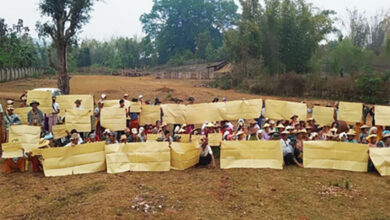Economic oppression drives Karen to the ‘mountain’

Economic necessity and ongoing oppression by military authorities in Karen State have driven many in the Karen community to seek employment in neighboring Thailand, providing some with the means to secure a better future for their families but also posing new challenges for Karen traditional culture.
Karen migrant workers in Thailand are increasingly known as “Bangkok Returnees,” a designation that conveys both envy and disgust among Karen communities. Those who return to Karen State bring with them the capital to purchase land or build larger homes for their families. But they also bear the signs of cultural influences picked up during their sojourn in the big city: western-style clothes and a more liberal lifestyle that many Karen deem to be at odds with traditional values.
Saw Chit Aye, 20, left his home in Kwin Kalay village in Karen State’s Kyain Seikgyi township to seek employment in Thailand, finding work in a restaurant in Bangkok in order to ease the financial burden placed on his family by draconian economic restrictions at home.
“Almost every day, there are new taxes or fees that our family has to pay to authorities. My parents don’t have anything to pay anymore. So to help contribute to those payments, I’ve come to Thailand for work,” he said.
Estimates of the numbers of Burmese migrant workers in Thailand vary. Thailand’s Ministry of Labor recorded 1.3 million legal Burmese migrant workers in 2009. The International Labor Organization put the figure at just more than 800,000 legal workers in 2010. But international NGOs and other organizations put the number, legal and illegal, anywhere between 2 million and 4 million.
Particularly susceptible to the lure of higher wages in Thailand are Karen State’s young people, who feel pressure to contribute to their family’s welfare and see the economic advantages enjoyed by “Bangkok Returnees” as an incentive.
A friend of Saw Chit Aye and fellow migrant worker from Lamphan village in Kyain Sikgyi township, said that the majority of young people in his village have left to seek work in Thailand.
“There are almost no young people in our village. [They] have gone to work on the “mountain,” said the friend, who asked not to be named.
The “mountain” is a translation of a Burmese word that refers to the route through the mountains where black market goods were transported from Thailand to Karen State.
“My village is very quiet now. As a young person, I don’t find it exciting to live there anymore, so I decided to find work on the “mountain.”
He is not alone. Most of Karen State is rural farmland, and the majority of young people from Kawkreik, Kyain Seikgyi and Hlaingbwe townships have followed a similar route to find work in Thailand, either through job brokers or making the difficult and dangerous journey on their own.
Saw Chit Aye said he never expected big wages, only the ability to earn enough to help support his family. Unlike some of the Bangkok Returnees, however, the reality of work abroad was different from his expectations.
“I have been working in a restaurant for almost one year. I used to work in an ice factory. I received only 3,500 baht a month at the factory. Now I get 4,500 baht per month at the restaurant. After paying my expenses in Bangkok, I can’t save much money in the end.”
Workers who attempt to find employment in Thailand through labor brokers face more pressing problems. Broker fees can run between 5,000 baht and 8,000 baht. Many cases of abuse at the hands of brokers or employers in Thailand have been reported, with young women particularly vulnerable to sexual abuse.
In a February 2010 report titled “From the Tiger to the Crocodile: Abuse of Migrant Workers in Thailand,” Human Rights Watch (HRW) said that migrant workers routinely face violence, torture, extortion and sexual abuse.
“Migrant workers make huge contributions to Thailand’s economy, but receive little protection from abuse and exploitation,” said Brad Adams, Asia director at HRW, said at the time of the report’s release.
Those who choose to use labor brokers often have to borrow money from neighbors to pay the required fees. If they are arrested by Thai authorities, they have no way to repay the debts.
Students are among a growing number of young people turning to Thailand to help their families. A middle school teacher in Kawkreik township said that several students each year drop out to pursue work in Thailand.
“In our school, five or six students each year drop out of school and go to Bangkok for work. They leave school because of difficulties in their families’ livelihoods. Parents want their children to be educated, but they have no choice,” said the teacher, who asked not to be named.
“As they can’t manage to pay all the excessive taxes and fees at home, they have to send their children to Thailand.”
In Thailand, jobs for men and women fall into a few predictable categories, migrant workers say. Women find employment as domestic workers, restaurant servers and shopkeepers, while others end up in the sex trade. Men generally find work in restaurants, at construction sites, or in workshops or factories.
The departure of growing numbers of young people from Karen State has left a void that one village headman said has imperiled the continuity of Karen cultural traditions.
“In a village, we need young men and women to help with traditional ceremonies that are regularly celebrated. When there are no young people around, it makes a huge difference,” said the headman, who asked not to be named.
He added that exposure to different values in Thailand has also changed the behavior and character of young Karen.
“They leave at a young age and are exposed to foreign cultures and traditions. So they don’t know about their own culture and their characters have changed.”
The mother of a young woman employed as a domestic worker in Bangkok said she feared for the safety and character of her daughter.
“I always worry about her. I worry that she will be arrested by police. As long as she is out of my sight, I worry and can’t sleep.”
Particularly affected by the drain on young people are Karen villages situated near the Thailand border, where residents say that of populations of young people that were once between 100 and 200, only about 10 on average remain in their home villages.
But the lure of employment and the opportunity to learn new skills continues to draw workers from Karen State, despite the dangers and the perceived effects on traditional culture.
“While I work here, I learn skills and earn money,” said a 16-year-old from Kawkreik township. “If I stayed in my village, for those like me who are not educated, we could do nothing to earn a living. So many young people go to the “mountain” for work.”




